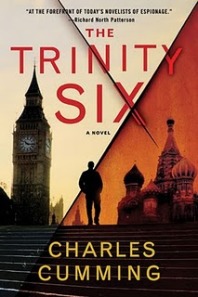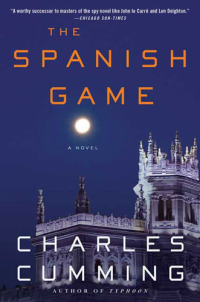The Trinity Six by Charles Cumming
 Thursday, March 24, 2011 at 2:37PM
Thursday, March 24, 2011 at 2:37PM 
Published by St. Martin's Press on March 15, 2011
Of all the Charles Cumming novels, my favorite remains The Hidden Man, a novel that -- like a Hitchcock movie -- generates suspense by placing unwitting individuals in unforeseen peril. Cumming tries to do that again in The Trinity Six by sending Professor Sam Gaddis on a quest to identify the sixth and final member of the Cambridge spy ring that included the infamous Kim Philby. While The Trinity Six is an enjoyable novel, it fails to create the same atmosphere of danger that makes The Hidden Man Cumming’s reigning masterpiece.
The identity of the sixth spy is never in doubt; Cumming reveals it on the first page. Gaddis learns of it after a journalist friend asks him to co-author a book based on a story she plans to write that will reveal the spy’s name to the public. The journalist dies soon after that conversation, leaving Gaddis to pursue the truth on his own. His investigation leads him to an elderly man named Thomas Neame who provides either valuable information or calculated disinformation. For much of the novel, Gaddis remains credibly clueless as he is played by one intelligence agency and stalked by another. Eventually his search takes him country hopping and, as is typical in espionage thrillers, when he unearths individuals who can bring him closer to the truth they tend to die.
As he does in his other novels, Cumming derives excitement from intellectual challenge rather than shootouts and chases. The difficult task of separating truth from falsehood animates the story. That technique worked well in Cumming’s last Alec Milius novel, The Spanish Game, but it is less successful here. The palpable tension and riveting suspense that characterizes Cumming’s best work never materializes in The Trinity Six. This is not to say that the story is dull or not well told; Cumming is a fine writer with a literary style that sets him apart from typical espionage novelists. Gaddis and the supporting cast are interesting characters and the plot unfolds at a steady but unrushed pace. Ultimately, however, the novel lacks the heft of Cumming’s most enjoyable novels. I recommend The Trinity Six to fans of espionage fiction, but with the warning that they might be disappointed if they expect it to live up to the standard Cumming set in some of his earlier novels.
RECOMMENDED
 TChris |
TChris |  Post a Comment |
Post a Comment |  Charles Cumming,
Charles Cumming,  Recent Release,
Recent Release,  spy in
spy in  Thriller
Thriller 

